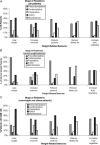Stage of readiness to control weight and adopt weight control behaviors in primary care
- PMID: 15963162
- PMCID: PMC1490121
- DOI: 10.1111/j.1525-1497.2005.0074.x
Stage of readiness to control weight and adopt weight control behaviors in primary care
Abstract
Background: While the majority of adults are attempting weight loss at any given time, few engage in optimal diet and exercise. We examined factors associated with being in advanced stages of behavior change for weight loss, diet, and exercise.
Methods: We surveyed primary care patients about their health, health habits, and perception and advice about weight as health risk, and about stage of readiness to lose weight, improve diet (control food portions, limit fat intake, increase fruits and vegetables), and increase planned exercise using the Prochaska Stage of Behavior Change model. We conducted bivariable analyses to describe the association between being at the preparation (change in 1 month), action (changing now), and maintenance (maintaining change) stages of change for weight loss and being at 1 of these 3 advanced stages for improving diet and exercise. We also conducted multivariable analyses to examine factors associated with being at these advanced stages of readiness to concurrently lose weight, improve diet, and increase exercise.
Results: Of 365 patients (response rate of 60%), 33% were overweight (body mass index [BMI], 25.0-29.9 kg/m(2)) and 27% were obese (BMI, 30.0+kg/m(2)). Of 199 respondents at the preparation, action, or maintenance stage of losing weight, 61% were also at an advanced stage for improving diet and exercise. Those perceiving weight as a health risk were more likely to be at advanced stages of readiness to concurrently lose weight, improve diet, and increase exercise (adjusted odds ratio [AOR], 5.6; 95% CI, 2.5 to 12.5) after adjustment for confounders; this perception was associated with BMI ([AOR, 1.2; 95% CI, 1.1 to 1.3 for each unit increment in BMI]) and being advised by a physician about weight as a health risk (AOR, 6.7; 95% CI, 3.0 to 15.1). Demographic factors, having obesity-related comorbidities, and mental and physical functioning did not appear important.
Conclusions: A large proportion of primary care patients are at advanced stages of readiness to lose weight, improve diet, and increase exercise. Future studies should examine the effectiveness of primary care interventions to help patients optimize weight-related behavior.
Figures
References
-
- Mokdad AH, Marks JS, Stroup DF, Gerberding JL. Actual causes of death in the United States, 2000. JAMA. 2004;291:1238–1245. - PubMed
-
- Flegal KM, Carroll MD, Ogden CL, Johnson CL. Prevalence and trends in obesity among US adults, 1999-2000. JAMA. 2002;288:1723–7. - PubMed
-
- Whelton PK, Appel LJ, Espeland MA, et al. Sodium reduction and weight loss in the treatment of hypertension in older persons: A randomized controlled trial of nonpharmacologic interventions in the elderly (TONE). TONE Collaborative Research Group. JAMA. 1998;279:839–46. - PubMed
-
- Blumenthal JA, Sherwood A, Gullette EC, et al. Exercise and weight loss reduce blood pressure in men and women with mild hypertension: effects on cardiovascular, metabolic, and hemodynamic functioning. Arch Intern Med. 2000;160:1947–58. - PubMed


